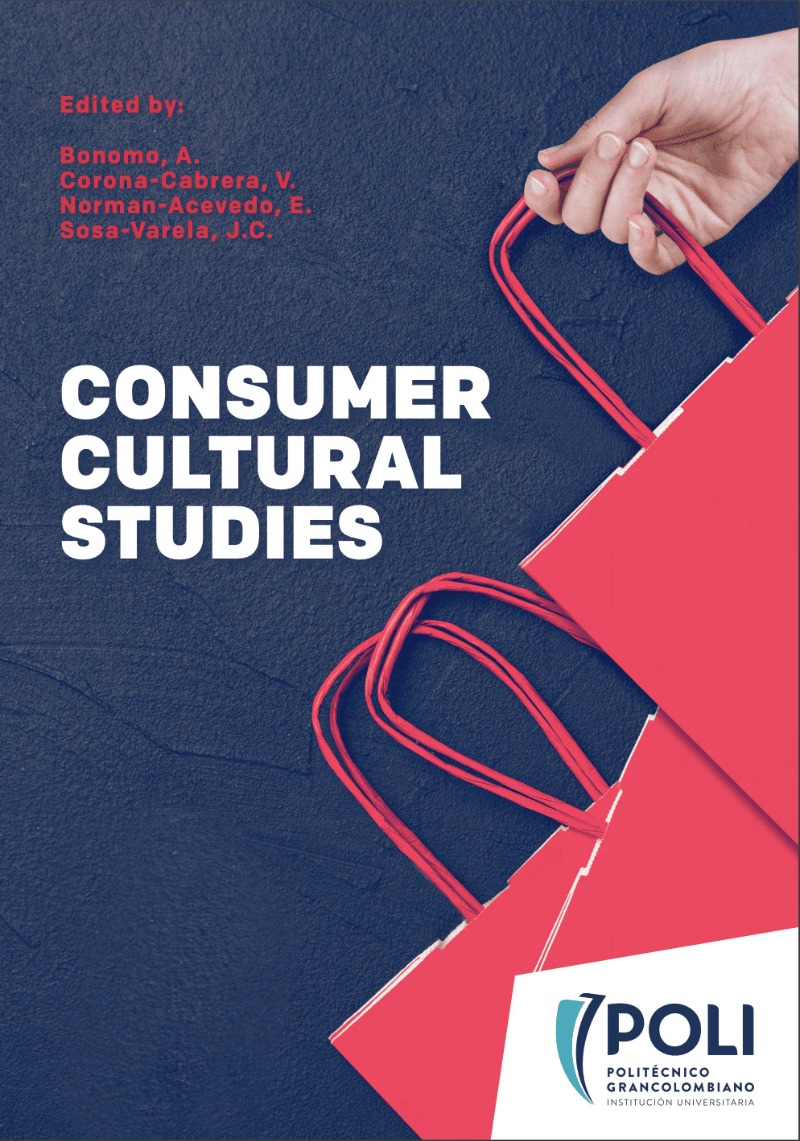Resumen
The objective of this document is to resume the increasing importance of qualitative market research, which has shown growth not just in scientific journals but also has larger numbers compared to quantitative research. The first step was reflecting on research in marketing and the possibilities it offers to get to know consumers and purchasing habits. The methodology applied is divided in two moments: the first moment is based on bibliometrics, which reviews trends in publications, and in the second moment, different scenarios from marketing research are proposed based on experts’ opinions and prospective methods (Smic Prob-Expert method). The conclusion is that in the future, research will become a discipline that is largely associated to sensory and neurological studies, operated with social networking strategies and oriented to the description of specific phenomena, all of which will lead to a new scientific anthropo-marketing.
Referencias
Amer, M., Daim, T., & Jetter, A. (2013). A review of scenario planning. Futures, 46, 23-40.
Aranda, M. (2001). Método de los escenarios: apuntes teóricos. Recuperado de: www4.ujaen.es/~egarcia/programadedirest05-06.doc
Arias, Á., Durango, A., & Navarro, M. (2016). Curso de Marketing Online: 2ª Edición. IT Campus Academy.
Arnett, D., & Wittmann, C. (2014). Improving marketing success: The role of tacit knowledge exchange between sales and marketing. Journal of Business Research, 67(3), 324-331.
Barahona, I., Hernández, D., Pérez-Villarreal, H., & Martínez-Ruíz, M. (2018). Identifying research topics in marketing science along the past decade: A content analysis. Scientometrics, 117(1), 293-312.
Bohnenberger, M. (2017). Marketing interno: la actuación conjunta entre recursos humanos y marketing en busca del compromiso organizacional. Universitat de les Illes Baleares. Doctoral thesis. Retrieved from: http://dspace.uib.es/xmlui/handle/11201/2699
Brannen, J. (Ed.). (2017). Mixing methods: Qualitative and quantitative research. Routledge.
Burke, R. (2018). Virtual Reality for Marketing Research. In Innovative Research Methodologies in Management (pp. 63-82). Palgrave Macmillan, Cham.
Cano, A. (2015). Las relaciones sociales entre el proveedor y el comprador. Aplicación empírica del Marketing Relacional: un caso de estudio/The Social Relations Between the Supplier and the Buyer. Empirical Application of Relationship Marketing: A Case of Study. Revista Internacional de Ciencias Sociales, 4(1).
Dávila, G., & Dávila, M. (2014). Metodología de la Investigación. Grupo Editorial Patria.
Delgado, M. (2017). Método y metodología de la investigación científica. Retrieved from: http://fti500marceladelgado.blogspot.com.co/2010/05/taller-5-metodo-y-metodologia.html
East, R., Singh, J., Wright, M., & Vanhuele, M. (2016). Consumer behaviour: Applications in marketing. Sage.
Farris, P., Bendle, N., Pfeifer, P., & Reibstein, D. (2015). Marketing metrics: The manager's guide to measuring marketing performance. FT Press’s be combined? Journal of Comparative Social Work, 4(1).
Gantman, E., & Rodríguez, C. (2017). Literatura académica de administración en países de habla hispana: Análisis bibliométrico de la producción en revistas de la base Latindex, Catálogo (2000-2010). Investigación Bibliotecológica. Archivonomía, Bibliotecología e Información, 31(72), 39-61.
Godet M., (1997). Manuel de prospective stratégique, tome 2: L’art et la méthode. Paris: Dunod.
Godet, M., & Durance, P. (2007). Prospectiva Estratégica: problemas y métodos. Cuadernos de LIPSOR, 104.
Gómez, W.; Gonzales, E., & Rosales, R. (2015). Metodología de la Investigación. Universidad María Auxiliadora. Retrieved from: http://repositorio.uma.edu.pe/handle/UMA/96
Grünig, R., & Kühn, R. (2015). Global Environmental Analysis. In The Strategy Planning Process (pp. 89-96). Springer Berlin Heidelberg.
Gutiérrez, J. (coord.) (2007). La investigación social del turismo: perspectivas y aplicaciones. Madrid: Paraninfo.
Gutiérrez, J., & Delgado, J. (1999). Métodos y técnicas cualitativas de investigación en ciencias sociales. España: Síntesis.
Hanssens, D. (2018). The value of empirical generalizations in marketing. J. of the Acad. Mark. Sci. (2018) 46: 6. https://doi.org/10.1007/s11747-017-0567-0
Hernández, J. (2013) Escenarios y prospectiva política. Morelia, Michoacán. Retrieved from: https://es.slideshare.net/ICADEP/escenarios-y-prospe-abelardo-23418874
Hulland, J., Baumgartner, H., & Smith, K. (2018). Marketing survey research best practices: evidence and recommendations from a review of JAMS articles. Journal of the Academy of Marketing Science, 46(1), 92-108.
Hussein, A. (2015). The use of triangulation in social sciences research: Can qualitative and quantitative methods be combined? Journal of Comparative Social Work, 4(1).
Kotler, P., & Keller, K. (2009). Dirección de marketing. México: Pearson educación.
Layton, R., & Duan, Z. (2015). Diversity in Marketing System Assortments. Journal of Macromarketing, 35(3), 320-333.
Leonidou, L., Katsikeas, C., Samiee, S., & Aykol, B. (2018). International marketing research: A state-of-the-art review and the way forward. In Advances in Global Marketing (pp. 3-33). Springer, Cham.
Lipowski, M., Pastuszak, Z., & Bondos, I. (2018). Synergy of Quantitative and Qualitative Marketing Research− Capi and Observation Diary. Econometrics, 22(1), 58-67.
López, C., Sossa, J., Zarta, R., Reveiz, R., Gómez, C., Uribe, J., & Garcés, J. (2016). Vigilancia Tecnológica y Análisis del Ciclo de Vida de la Tecnología: Revisión de herramientas para el diagnóstico empresarial y la aplicación del ciclo de vida del producto en el sector turismo. Espacios, 37(36).
López-Bonilla, J., López-Bonilla, L., & Peña-Vinces, J. (2015). Marketing Information Systems: An integrative view. Tourism & Management Studies, 11(2), 197-203.
Malhotra, N. (2008). Marketing research: An applied orientation, 5/e. India: Pearson Education.
McBride, M., Lambert, K., Huff, E., Theoharides, K., Field, P., & Thompson, J. (2017). Increasing the effectiveness of participatory scenario development through codesign. Ecology and Society, 22(3).
Rani, P. (2014). Factors influencing consumer behaviour. International journal of current research and academic review, 2(9), 52-61.
Rowley, J. (2016). Information marketing. Routledge.
Sandhusen, R. (2005). Mercadotecnia Internacional. 2ª. Edición, México: Editorial Grupo Patricia Cultural SA de CV.
Sarpong, D., Maclean, M., & Davies, C. (2013). A matter of foresight: How practices enable (or impede) organizational foresightfulness. European Management Journal, 31(6), 613-625.
Sekaran, U., & Bougie, R. (2016). Research methods for business: A skill building approach. John Wiley & Sons.
Smith, L., & Wong, M. (Eds.). (2016). Reference and Information Services: An Introduction. ABC-CLIO.
Solomon, M. (2014). Consumer behavior: Buying, having, and being (Vol. 10). Upper Saddle River, NJ: Prentice Hall.
Stratigea, A., & Papadopoulou, C. (2013). Foresight analysis at the regional level-a participatory methodological framework. Journal of Management and Strategy, 4(2), 1.

Esta obra está bajo una licencia internacional Creative Commons Atribución-SinDerivadas 4.0.
Derechos de autor 2020 Institución Universitaria Politécnico Grancolombiano





